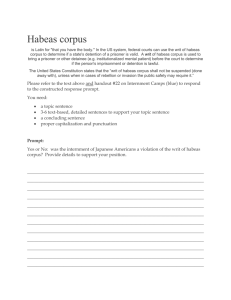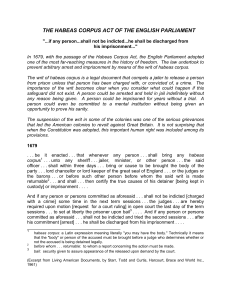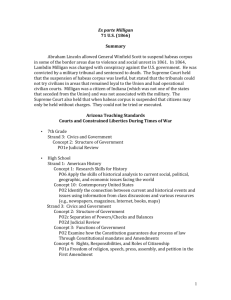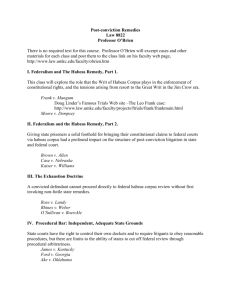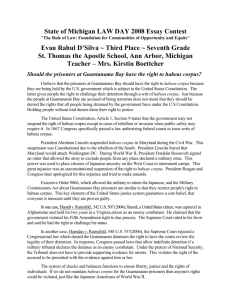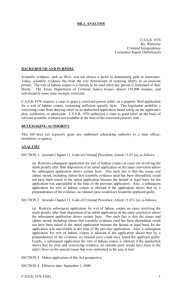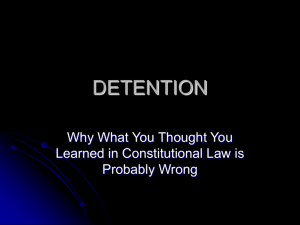Emergency-Powers
advertisement
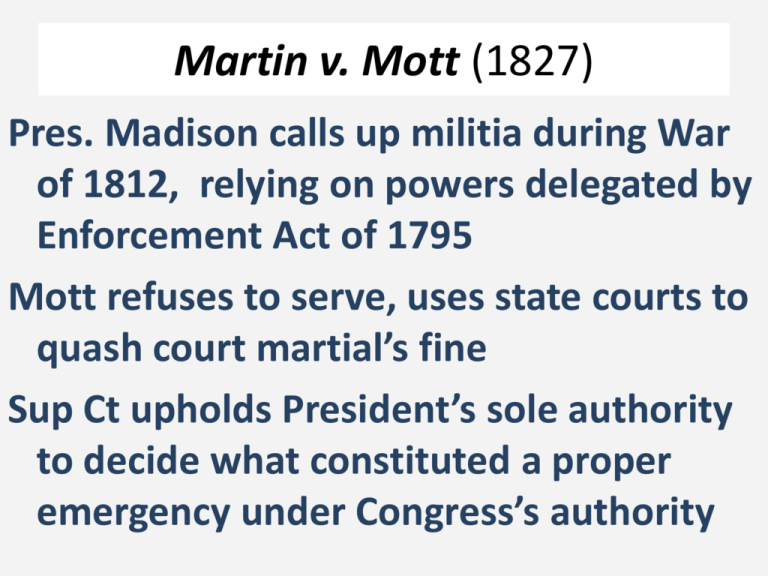
Martin v. Mott (1827) Pres. Madison calls up militia during War of 1812, relying on powers delegated by Enforcement Act of 1795 Mott refuses to serve, uses state courts to quash court martial’s fine Sup Ct upholds President’s sole authority to decide what constituted a proper emergency under Congress’s authority Military Law Cases during WWII Hirabayashi v. U.S. (1943) Curfew and reporting to assembly centers Ex parte Endo (1944) The U.S. cannot detain a citizen that the government itself concedes is loyal Korematsu v. U.S. (1944) Internment camps and exclusion Duncan v. Kahanamoku (1946) (no ethnic issue) Suspension of Hawaiian territorial law, use of military tribunals – overturned by Ct (in 46) Hirabayashi v. U.S. (1943) Hirabayashi was convicted of violating a curfew and relocation order Hirabayashi argued that a March, 1942 Act of Congress delegated excessive power to the President & military commanders Sup Ct found delegation proper and avoids questions of racial bias entirely In 1986-7, Hirabayashi's convictions were vacated by federal district court. Hirabayashi v. U.S. (1943) “The war power of the national government is 'the power to wage war successfully‘…It extends to every matter and activity so related to war as substantially to affect its conduct and progress.” Chief Justice Stone Ex parte Endo (1944) Mitsuye Endo relocated from Sacramento home to Tule Lake camp, then Topaz, UT There was no evidence of disloyalty by Endo, the Govt conceded such and claimed no need to detain her except as an “essential step” in the larger internment process Court orders her release as individuals should not be detained for administrative convenience Decided same day as Korematsu, unanimous, and avoided specific issues in Korematsu Youngstown Sheet & Tube v. Sawyer (1952) Steelworkers union threatens strike Truman see strike as threatening Korean War Truman directs Commerce Sec. Sawyer to seize and operate mills to avoid strike Congress considered, and rejected, provision for such in 1947 (Taft-Hartley) New York Times v. US (1971) Pentagon Papers were a 47 volume official documentary history of Vietnam involvement Leaked to NY Times, and vetted by Times over 6 month period Showed multiple acts of official dishonesty, undermined stated purposes of the war Habeas corpus Art I, Sec 9: The privilege of the Writ of Habeas Corpus shall not be suspended, unless when in Cases of Rebellion or Invasion the public Safety may require it. Located with congressional powers Habeas corpus “You [shall] have the body“ First recorded usage in 1305 Habeas Corpus Act 1679 (England) established that the command of the King or the Privy Council was no answer to a petition of habeas corpus. Habeas corpus Constitution restricts Congress’ power to restrict writ, but does not define right to the writ Generally interpreted according to common law Boumediene v. Bush refers to "the writ as it existed in 1789” Ex parte Merryman (1861) April 19, 1861, Marylanders attack a Mass. regiment passing through Baltimore, 2 days later Lincoln suspends habeas corpus through executive order to Army command Merryman, a Lt. in Maryland militia, was arrested May 25, suspected of possessing arms and Confederate sympathies; charged with treason. Ex parte Merryman (1861) Merryman, a Lt. in Maryland militia, was arrested May 25, suspected of possessing arms and Confederate sympathies; charged with treason. immediately files petition for habeas corpus with Circuit Court for the District of Maryland. C.J. Taney hears case as circuit judge. Ex parte Merryman (1861) Taney’s initial ruling: 1. That the president [...] cannot suspend the privilege of the writ of habeas corpus, nor authorize a military officer to do so. 1. That a military officer has no right to arrest and detain a person not subject to the rules and articles of war [...] except in aid of the judicial authority, and subject to its control. Ex parte Merryman (1861) The Army refused to accept Taney’s writ. Lincoln ignored Taney’s order and continued suspension of habeas corpus for two additional years until Congress passed the Habeas Corpus Act of 1863. Merryman remained under arrest for treason, without trial, until 1867, when the charges were dropped. Ex Parte Milligan (1866) J. Davis concludes (for Court) that neither President nor Congress can authorize tribunals while courts open CJ Chase (w/ 3 others) finds that Congress did not authorize such tribunals, but that Congress could have Ex parte Quirin (1942) 8 German spies landed on Long Island from a U-Boat and were promptly captured and tried by a military tribunal Question was whether prisoners had right to habeas corpus review by civilian courts before execution for violating law of war. Ex parte Quirin (1942) Court found that there was a proper right to habeas review Court also found military tribunal proper even though civilian courts functioning b/c prisoners were enemy soldiers operating outside proper law of war by failing to wear their uniforms Johnson v. Eisentrager (1950) Eisentrager et al were German military personnel captured in China by the U S Army and tried and convicted in China by an American military commission for violations of the laws of war committed in China prior to their capture. They were transported to the US-occupied part of Germany and imprisoned by the US Army. At no time were they within the territorial jurisdiction of any US civil court. Johnson v. Eisentrager (1950) Eisentrager et al argued that they should be provided with all constitutional safeguards used in US courts Sup Ct: “We are cited to no instance where a court, in this or any other country where the writ is known, has issued it on behalf of an alien enemy who, at no relevant time and in no stage of his captivity, has been within its territorial jurisdiction.” Johnson v. Eisentrager (1950) “the privilege of litigation has been extended to aliens, whether friendly or enemy, only because permitting their presence in the country implied protection … these prisoners at no relevant time were within any territory over which the United States is sovereign, and the scenes of their offense, their capture, their trial and their punishment were all beyond the territorial jurisdiction of any court of the United States” Hamdi v. Rumsfeld (2004) Hamdi was U.S. citizen by birth, grew up in Saudi Arabia (also citizen), captured by Northern Alliance. US claimed Hamdi was fighting w/ Taliban, Hamdi claimed he was a noncombatant relief worker Hamdi v. Rumsfeld (2004) Hamdi first sent to Guantanamo, then sent to naval brig in VA after discovery of US citizenship. Held without access to an attorney or the court system Father hires attorney and acts as “next friend” Hamdi v. Rumsfeld (2004) The Court recognized the power of the government to detain unlawful combatants, but ruled that detainees who are U.S. citizens must have access to attorney and the ability to challenge their detention before an impartial judge.
